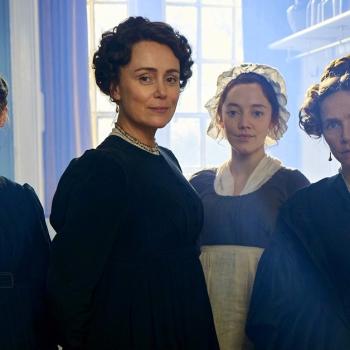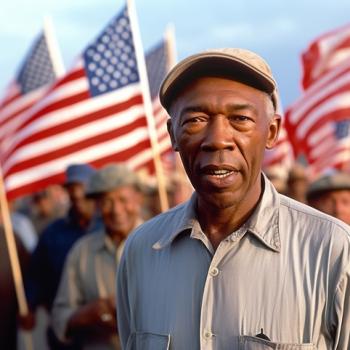Lectionary Reflections
Genesis 25:19-34
July 13, 2014
We continue the saga of Genesis with an obvious curtain raiser on the figure who will dominate much of the remainder of the tale: Jacob. The narrator brilliantly, and in the very shortest of strokes, paints for us the sort of character this Jacob is. The authors of these unforgettable stories are as much interested in the kinds of people who populate the accounts as they are concerned about the ongoing plot itself. Surely it could have been far easier to tell a simple story of the triumph of the chosen Israelites, perfectly God-inspired figures, who worked always in the will and way of YHWH, effecting the divine will at every turn, rushing inexorably to the promised land given freely to them. Ironically, that is the picture that the church has too often conjured up when these stories are told, namely, perfect people, perfectly in the will of God. The moral? Be like them, you modern pew dwellers!
But that is exactly what the stories do not say. Rather, they announce that we already are like these characters, interested far more in our own will than YHWH's, concerned more with what we desire than what God desires for us and for our community. This reality is what makes these stories still worth reading, because they are still describing us today, however much we want to claim they we are not like them; in fact, we are. We are Jacob; we are Esau; we are Abraham and Sarah. Let's explore the various ways that is true.
After the death of Abraham (Gen. 25:8), the next generation of the patriarchs and matriarchs of the chosen take the stage. We have already witnessed the wonderful courtship and marriage of Isaac and Rebekah. Yet soon after the love match is sealed, the cloud that has darkened the previous long story of Abraham and Sarah floats onstage. "Isaac prayed to YHWH for his wife, because she was barren" (Gen. 25:19). Like Sarah before her, the threat to the promise of becoming a "great nation" (Gen. 12:2) is palpable. Fortunately, YHWH grants Isaac's plea, and Rebekah becomes pregnant.
But the threat is hardly over; the pregnancy is difficult. "The children struggled in her womb, and Rebecca said, 'If it is like this, then why in Sheol am I?'" (Gen. 25:22) What Rebekah actually says is notoriously difficult to translate: the NRSV reads, "If it is to be this way, why do I live?" That appears to be the gist of the thing, but my reading is perhaps more literal. I have added "in Sheol," because the little enclitic particle, zeh, when following the interrogative "why" (lamah) seems to mean something like "in hell," a sharp strengthener of the question, much as you and I would ask a question in the strongest way we can. Rebecca seems to be saying that if pregnancy is like this, then she would just as soon take a pass on it!
But first, enquiring religious minds want to know, so she goes to "inquire" of YHWH, the verb being a technical one describing a trip to the holy oracle to discover what is going on. And she gets an earful from YHWH.
"Two nations are in your womb (which surely could account for the difficulty of the pregnancy!), and two peoples born from you will be divided; one will be stronger than the other, and the elder will serve the younger" (Gen. 25:23).
In a shocking proclamation, YHWH has turned all expectation upside down. In a culture where the eldest receives the promises and the blessings of the family, YHWH proclaims, "Not this time!" When these two boys are born the stronger one will serve the younger and weaker one. Thus is the life-long fight between the sons announced even before their birth. And in addition, Rebecca's inside knowledge of this reality concerning her children determines the fight between her and the sons and with her husband over the birthright and blessing.
On the day of the birth, the prophecy immediately is manifest right in the birth canal. The first-born comes out red and hairy and is thus named, Esau, a play on his hairy form, the word being "se'ar." This word is very close in sound to the country name Seir whose founding patriarch Esau will be. The second child appears in a most peculiar way; he pops out "his hand grasping Esau's heel," so they call him ya'cob or "heel grabber" or perhaps "one who replaces." One can readily see that the hairy Esau will not gain the better of his younger brother, the one who will in fact replace him. It is valuable to get a picture of this birth in mind as you paint this scene for your hearers, the Neanderthal-like Esau and the grasping Jacob, grabbing the heel of his brother, holding on for dear life, holding on to replace him, to oust him from his rightful places as bearer of the promise and the blessing. My mentor, Bill Power, used to name the twins "Hairy and Grabby."
The text wastes no time as the twins grow up in the first two words of 25:27. The boys are characterized with two short adjectival descriptions: Esau is a "knower of the hunt, a man of the field," while Jacob is "a tent dweller," an "ish tam." How to read this Hebrew phrase has been the source of vast commentary. Literally, the words appear to mean "an upright man," "a man of profound moral character." These are the words used to describe the paragon Job twice in the first chapter of that story, used once by the teller of the tale (Job 1:1) and once by YHWH (1:8). There, Job must be seen as morally perfect if the story of his fall is to have the sting it needs to force the reader to reflect on the fact of a good man who does not receive a concomitant reward, as would be expected by many traditional believers.





